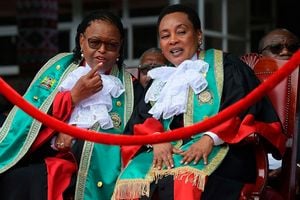
Kiambu County Senator Karungo Thang’wa.
Senators and governors are headed for a major clash over a new push by the lawmakers to have county chiefs appear before the Senate plenary to answer questions about their counties.
In a move similar to the current practice where Cabinet Secretaries appear before the plenary of the Senate and National Assembly to answer questions about their ministries, the senators want governors to follow suit.
The proposal, spearheaded by Kiambu Senator Karungo Thang'wa, also seeks to outline action to be taken in cases where governors fail to attend.
In April last year, senators passed amendments to the Standing Orders of Parliament to allow CSs to appear in person before plenary. Currently, ministers appear before the Senate on Wednesday mornings.
Senator Thang'wa wants the county chiefs to also appear before the House to answer questions and provide information on county matters.
Currently, governors answer questions from senators through their respective standing committees.
The new proposal already has the support of 24 senators, the minimum number required to table such a motion, including Senate Majority Leader Aaron Cheruiyot, Deputy Speaker and Meru Senator Kathuri Murungi, Majority Whip Boni Khalwale, Deputy Minority Whip Edwin Sifuna, Vihiga Senator Godfrey Osotsi and his Kirinyaga counterpart Kamau Murango.
Billions of shillings
The radical move comes at a time when senators have been locked in battles with some governors over their continued snubbing of Senate committee invitations and summonses meant to scrutinise the running of the counties, including the spending of billions of shillings by the devolved units.
Nairobi Governor Johnson Sakaja was last week forced to pay Sh500,000 for failing to honour more than four summonses from the Senate Committee on Roads, Transport and Housing, which is investigating the Nairobi County government’s plans to redevelop 13 old county estates.
Apart from Governor Sakaja, other county bosses who have faced the wrath of the Senate for snubbing committee meetings include Kiambu Governor Kimani Wamatangi, Nathif Jama (Garissa), Ahmed Abdullahi (Wajir), Muhamed Mohamed Ali (Marsabit) and Mohamed Adan Khalif (Mandera).
Speaking to the Nation on Sunday, the Council of Governors’ legal committee chairperson Mutula Kilonzo Jr said the proposal is not useful except for the senator of a governor set to appear.
“The plenary ( otherwise called the Committee of the Whole House ) is a tool to be used sparingly and for justifiable cause. Except for my senator, of what use is it to appear at plenary before all senators?” posed the Makueni county boss.
Kisumu Governor Prof Anyang’ Nyong’o said he sees no reason for such a proposal since governors are already appearing before relevant committees of the Senate.
He pointed out that governors are not Cabinet secretaries and if they want their equivalents then counties have people in charge of what is equivalent to ministries.
Nyeri’s Kahiga Mutahi agreed with his counterparts, saying there will be no difference as governors always appear before Senate committees.
However, Nairobi Governor Johnson Sakaja welcomed the proposal, saying it will allow for a wide range of issues to be covered.
“That is a wonderful proposal. It is better than going every other day to different committees. A wide range of issues can be covered this way,” he said.
His Murang’a counterpart Irungu Kang’ata also supported the proposal, saying he has no problem appearing before the Senate plenary as long as it is done in accordance with the law.
However, the County Assemblies Forum (CAF) threw cold water on the move.
County assemblies
CAF secretary-general and Ngara MCA Chege Mwaura said that as far as oversight of devolution matters is concerned, the first instance should be the county assemblies.
He argued that the assemblies are in a position to scrutinise items relating to counties just as the National Assembly does with ministries, a mandate that the Senate lacks.
“Chief executives and CECs appear before the assemblies because they are the direct line from their departments. To bring governors back to the Senate is not right in my opinion,” said Mr Mwaura.
The Senate last week approved an amendment to the Parliamentary Powers and Privileges Act, 2017 to increase the fine for failing to honour a summons from the current Sh500,000 to Sh2 million.
Senator Thang'wa now wants the Senate to introduce new clauses in the Senate Standing Orders to allow governors to appear before the House.
He explained that the move will ensure that the principles of accountability are upheld in line with Article 96 of the Constitution.
According to the article, the Senate represents the counties and serves to protect the interests of the counties and their governments, as well as exercising oversight over national revenues allocated to county governments.
It will also ensure that county leaders are accountable to the people and deal with cases of controversy and allegations of misconduct.
To implement this far-reaching proposal, Mr Thang'wa is proposing an amendment to the Senate Standing Orders to introduce new clauses to Standing Order 59.
Select Committees
The new Standing Order will have four parts, with 59(a) providing for the process by which a governor responds or provides information, while 59(b) will provide for the content of the information sought, which is not related to matters before the Select Committees on Finance and Public Accounts.
Part (c) will provide for responses to information requested by senators, while 59(d) will provide for action to be taken in the event of non-attendance by governors.
“I therefore submit my considered proposal to introduce a new clause 59 immediately after Standing Order 58 to provide for governors to appear before the Senate in plenary to respond and provide information on matters in the districts,” he said.
Senate Standing Orders 268(1) and (2) provide a procedure whereby a senator may request the Procedure and Rules Committee to consider an amendment to the Standing Orders.
Accordingly, a senator may, with the support of at least 15 other senators, request the Procedure and Rules Committee to consider an amendment to the Standing Orders.
The request must be in writing, contain the text of the proposed amendment and the reasons for the proposal, the names and signatures of the senators supporting the request, and be submitted to the Speaker.
The proposal has already been submitted to Speaker Amason Kingi in a letter dated February 29, 2024.
Speaker Kingi is now expected to satisfy himself that the motion meets the above requirements before referring it to the Procedure and Rules Committee.
The committee shall, within 21 days of receipt of a motion, consider the motion and present a report to the Senate containing the amendments proposed in the motion and the committee's recommendations on each such proposal.
The Senate shall then consider the proposed amendments to the Standing Orders as reported by the Procedure and Rules Committee on a motion that the report of the Procedure and Rules Committee be approved.
If the proposal passes, the Senate is expected to set a date for the governors to appear before it.







